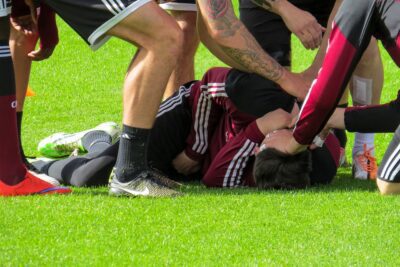Sports Injury: Most athletes will experience an injury at some point in their careers. While some injuries are more serious than others, all injuries require some form of recovery in order to return to the playing field. Here are six tips to help you properly deal with a sports injury and get back on your feet as soon as possible.
1) Get the Right Treatment
If you are injured, the first thing you need to do is seek medical attention. Only a doctor can properly diagnose and treat your injury. Depending on the nature of the injury, you may require surgery, physical therapy, or medication. There are also stem cell orthopedic treatments in Atlanta, Columbus, and Augusta that can help you recover from a sports injury. These treatments use stem cells to help the body regenerate damaged tissue, which can speed up the healing process. Finding the right treatment is essential to a successful recovery, so carefully do your research!
2) Take Time Off
When you injure yourself, it is important to take some time off to allow the injury to heal. Depending on the severity of the injury, you may need to take a few days or a few weeks off from playing. Some of the most common sports injuries include ankle sprains, knee injuries, and hamstring strains. All of these injuries require time to heal properly, so don’t try to rush back into the game too soon. You could end up making the injury worse and prolonging your recovery. Taking some time off will help you fully recover from the injury and help you get right back on the field stronger than ever before.
3) Take Medicine if Necessary
If you are in pain, there is no shame in taking some medicine to relieve that pain. Painkillers, such as paracetamol, are most commonly used to help ease the pain. To relieve pain and reduce swelling, ibuprofen and other nonsteroidal anti-inflammatory medications (NSAIDs) pills or lotions can be used. Keep in mind that children under the age of 16 should not be given aspirin. However, when it comes to any type of medication, it is important to consult a doctor and listen to their instructions. It is not wise to take medication on your own because there can be side effects.
4) Wear The Right Gear
Whether you want to prevent an injury or are currently nursing an injury, it is important to wear the right gear. Proper protection can help prevent injuries from occurring in the first place or from worsening the current injury. If you are already injured, wearing the proper gear can help protect the injured area and speed up the healing process. When choosing sports equipment, make sure to choose products that are designed for your sport. For example, volleyball requires deep sneakers to protect the ankle from jumping injuries as much as possible.
5) Follow Your Doctor’s Orders
After the doctor prescribes the appropriate therapy and medication, it is important that you listen to their recommendations. Sports doctors are trained for all types of sports injuries and thus know best how to recover from such injuries the fastest. Do exactly what the doctor tells you, which means you will have to go to therapy as many times as they told you to, take the pills as they told you, and rest until they give you the green light to return to the field. Only if you listen to your doctor will you be able to recover quickly and without consequences from any sports injury that has befallen you.
6) Slowly Get Back Into The Game
No matter what injury you have suffered, even if it is a minimal injury such as a broken finger, it is important that you return to the game slowly. Do not try to do too much too soon. Start by practicing lightly and then gradually increase the intensity. If you feel any pain, stop what you are doing and consult your doctor. Returning to the game slowly will help reduce the chances of re-injuring yourself and will allow you to get back into the groove without any problems.
There are various sports injuries, from breaking fingers, joints, to major injuries such as back injuries. When you get injured, the most important thing is to find the right treatment for you. Your doctor can help you with that, so the most important thing is to listen to their advice. This includes monitoring the dose of medication and listening to their advice when it comes to returning to the field. Remember, the most important thing is to give yourself time and go slowly. Only in this way can you fully recover from an injury.
